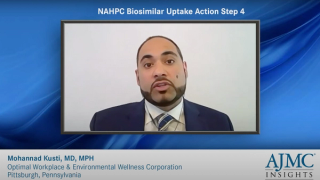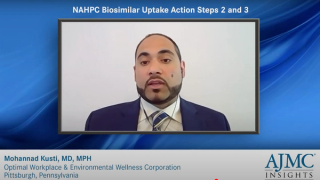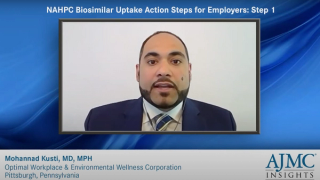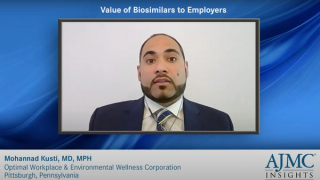
Employers
Latest News

Latest Videos

More News

Presented at AHIP’s Institute & Expo Online 2020, panelists discuss in a webinar how greater collaboration of health insurance providers with state and county leaders can ameliorate barriers to access to health care and promote timely interventions to improve health outcomes.

In a webinar presented at the AHIP Institute & Online Expo 2020, experts discussed how data analytics are addressing gaps in health care and providing timely, effective interventions.

Accelerating the shift to value-based care, as well as the growing presence of telehealth, may be potentially beneficial long-term effects of COVID-19 on the health care industry, said Dan Mendelson, MPP, founder of Avalere Health.

On this episode of Managed Care Cast, we speak with John Barkett, MBA, senior director of Policy Affairs in Benefits Delivery and Administration for Willis Towers Watson, on the current outlook of individual markets in private exchange solutions amid the pandemic.


A report by Innovaccer, titled “COVID-19: What It Means to American Healthcare: Trends, Impacts, Predictions, and the Road Ahead,” details implications of the pandemic for the US health care system, with additional recommendations on how to optimize emerging services such as telehealth.

To ease concerns from hesitant patients wary of the coronavirus disease 2019 (COVID-19) pandemic, physicians have implemented temperature checks and comprehensive symptom screening, as well as telehealth offerings to provide timely and effective care, said Brian LaMoreaux, MD, medical director of Horizon Therapeutics.

Vibhas Ratanjee is a senior practice expert with Gallup, based in Gallup's Irvine, California office. Vibhas is a well-known speaker and author and has contributed several articles on leadership and organizational development as well as how new technology will alter the future of work and the customer experience. His writing has featured in several global publications, including the Gallup Business Journal and the Harvard Business Review. Vibhas specializes in organizational development, culture change, and executive-level engagement strategies, including strengths-based leadership and succession management. Vibhas is also an executive coach and a leadership consultant to senior executives and CEOs. Vibhas works extensively in the health care and financial services sector.

A comprehensive workplace wellness program was shown to increase the proportion of employees with a designated primary care physician and improve employee beliefs on their own health. However, no significant effects were observed on physical health outcomes, rates of medical diagnoses, or health care service use, according to study findings published this week.

To safely accommodate the return of employees to the workplace amid the coronavirus disease 2019 (COVID-19) pandemic, employers have formed multidisciplinary task forces to address issues related to risk, testing, and impact on behavioral and physical health, said Michael Thompson, president and CEO of the National Alliance of Healthcare Purchaser Coalitions.
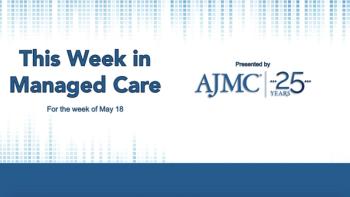
This week, the top managed care news included President Trump's use of hydroxychloroquine; early data on a COVID-19 vaccine trial; an inside look at physician burnout amid the pandemic.

Utilizing a consistent strategy consisting of 4 key attributes—trust, stability, compassion, and hope—can assist employers in designing an effective burnout strategy for physicians amid the coronavirus disease 2019 (COVID-19) pandemic and beyond, said Vibhas Ratanjee, senior practice expert at Gallup.

Vibhas Ratanjee is a senior practice expert with Gallup, based in Gallup's Irvine, California office. Vibhas is a well-known speaker and author and has contributed several articles on leadership and organizational development as well as how new technology will alter the future of work and the customer experience. His writing has featured in several global publications, including the Gallup Business Journal and the Harvard Business Review. Vibhas specializes in organizational development, culture change, and executive-level engagement strategies, including strengths-based leadership and succession management. Vibhas is also an executive coach and a leadership consultant to senior executives and CEOs. Vibhas works extensively in the health care and financial services sector.

On this episode of Managed Care Cast, we speak with Connie Chen, MD, chief medical officer at Lyra Health, about a recent study examining the efficacy, in real-world circumstances, of a structured, cognitive behavioral coaching program delivered through video or telephone.

Maureen is senior vice president, director of Value Transformation for PRECISIONvalue. Maureen has extensive experience as a C-level executive, clinician, academician, innovator, and coach in managed, integrated care. Nationally, she has developed innovative products and strategies for industry executives and access decision makers. Under her leadership, organizations have received recognition from eValue8, NCQA, and the National Academy of Medicine for innovative strategies that have reduced hospital readmissions, improved patient safety, and enhanced patient engagement. Since joining Precision, she has led more than 500 strategic quality and population health initiatives with 35 clients in 17 therapeutic areas. Her expertise includes adherence, behavioral health/social wellness, crisis management, patient engagement, population health, quality, social determinants of health, and value-based care.

Uncertainty remains surrounding the overall cost of care for employers, as subsequent waves of coronavirus disease 2019 (COVID-19)–related care may occur. Current projections suggest a lower health care spend due to deferral of nonrelated care, said Trevis Parson, chief actuary of Health & Benefits North America at Willis Towers Watson.

Coverage of our peer-reviewed research and news reporting in the healthcare and mainstream press.

As the COVID-19 pandemic continues to affect the mental health of US workers, Lyra Health has advised partnered employers to increase access to high quality, evidence-based mental healthcare, said Renee Schneider, PhD, vice president of Clinical Quality at Lyra Health.

As the coronavirus disease 2019 pandemic causes employers nationwide to implement strategies to efficiently operate amid potential revenue loss, the National Alliance of Healthcare Purchaser Coalitions released a comprehensive plan for employers and plan sponsors to optimize the delivery of advanced primary care.

Anti-anxiety and anti-insomnia prescriptions surged after mid-March after the coronavirus disease 2019 (COVID) pandemic was declared, said Glen Stettin, senior vice president and chief innovation officer at Express Scripts, who discussed the use of mental health and behavioral health prescriptions during the current public health emergency.

According to the most recent PwC Health Research Institute Consumer Survey results, the top consumer concerns for the post–coronavirus disease 2019 (COVID-19) period are overall health and financial well-being, with 32% saying health-related spending adjustments have already occurred or are in the planning stages.

As some states move to eschew social distancing recommendations by beginning plans to reopen businesses amid the coronavirus disease 2019 pandemic, a group of economists highlight in a recent study that the potential benefits of social distancing in saving lives far outweigh the projected damage to the economy.

Nearly 7 in 10 employees indicated in a survey by mental health provider Ginger that the coronavirus disease 2019 (COVID-19) pandemic is the most stressful time of their entire professional career, which has aligned with stark increases in new prescriptions of antidepressant, antianxiety, and anti-insomnia medications.

In the second part of a 2-part preview interview in advance of this year’s virtual 2020 Community Oncology Conference, The American Journal of Managed Care® speaks with Cheryl Larson, president and chief executive officer of the Midwest Business Group on Health, about how she is helping employer organizations navigate their pharmacy benefits managers and manage employee expectations.

In the first part of a 2-part preview interview in advance of this year’s virtual 2020 Community Oncology Conference, The American Journal of Managed Care® speaks with Cheryl Larson, president and chief executive officer of the Midwest Business Group on Health, about how she is helping employer organizations navigate their pharmacy benefits managers and manage employee expectations.



